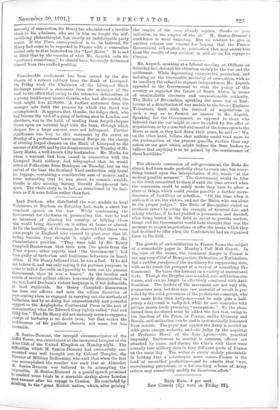Lord Durham, who distributed the war medals to local Volunteers
at Durham on Saturday last, made a short but trenchant speech on the war. While condemning the Government for slackness in prosecuting the war, he had no intention of abusing his country or helping those who would bring discredit on it either at home or abroad. As for the hostility of Germany, he observed that there were some people in England who seemed to gloat over that ill- feeling because they thought it might reflect upon Mr. Chamberlain's position. " They were told by Sir Henry Campbell-Bannerman that their men [we quote from the Times report; other reports read the Government'] had been guilty of barbarism and loathsome behaviour in South Africa, If Sir Henry believed that, he was a fool. If he did not believe it, and was only saying it for partisan purposes in order to inflict discredit and possibly to turn out the present Government, then he was a knave." As the brother and cousin of several gallant officers honourably distinguished in the war, Lord Durham's violent language is, if not defensible, at least explicable. Sir Henry Campbell - Bannerman has done our officers and men the odious disservice of representing them as engaged in carrying out the methods of barbarism, and by so doing has unquestionably lent powerful support to the Anglophobe Continental Press in the task of disseminating what Sir Edward Grey rightly called " foul and filthy lies." That Sir Henry did not seriously mean to suggest a charge of barbarity is no doubt true; but that makes the recklessness of his partisan *rhetoric not more, but less excusable.














































 Previous page
Previous page